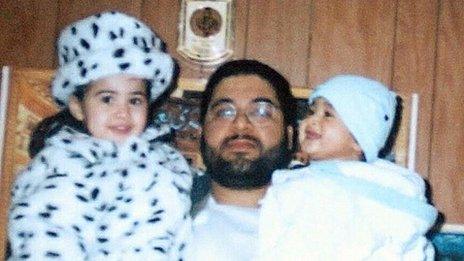Shaker Aamer: Last UK Guantanamo Bay detainee lands in Britain
- Published
Shaker Aamer has been held for 13 years, as Lucy Manning reports
The last British resident to be held in Guantanamo Bay has landed in the UK, having been detained for 13 years.
Shaker Aamer was held at the US military base in Cuba over allegations he had led a Taliban unit and had met Osama Bin Laden, but was never charged.
Downing Street said there were "no plans" to detain him after his arrival.
Mr Aamer said he felt "obliged" to everyone who fought for him to be released, and to "bring an end to Guantanamo".
"My thanks go to Allah first, second to my wife, my family, to my kids and then to my lawyers who did everything they could to carry the word to the world," he said.
"I am overwhelmed by what people have done by their actions, their thoughts and their prayers, and without their devotion to justice I would not be here in Britain now."
Concern has been raised over the health of the Saudi national, 48, whose family live in London, and the BBC witnessed an ambulance arrive at the airport.
Number 10 said Prime Minister David Cameron "welcomes" the release of Mr Aamer, who has permission to live in the UK indefinitely because his wife is British.
It also said any necessary security measures "will be put in place".
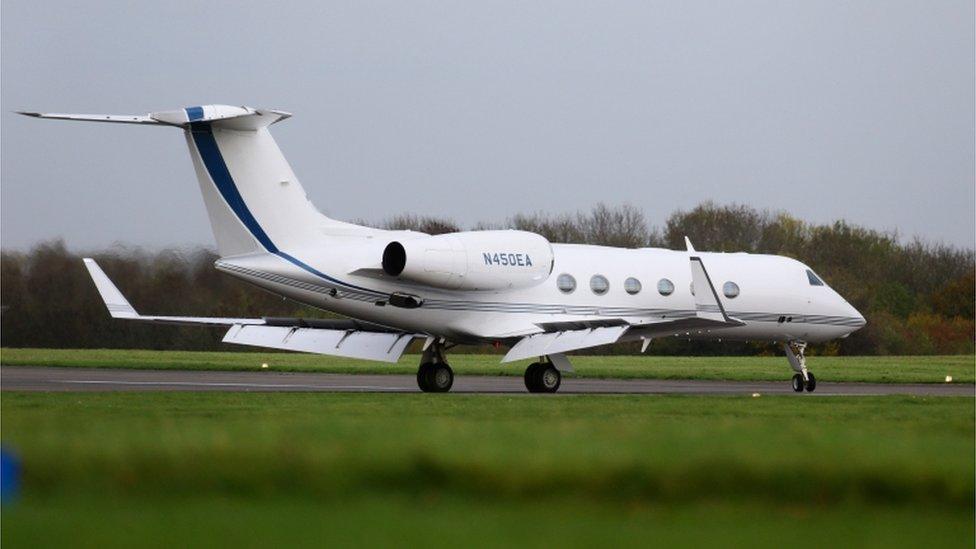
The plane, believed to be carrying Shaker Aamer, touched down earlier
The father-of-four landed at London's Biggin Hill Airport shortly before 13:00 GMT.
Mr Aamer's father-in-law, Saeed Siddique, said his release was a "miracle".
"It's a delightful day," he told BBC News while admitting it was also a "surprise".
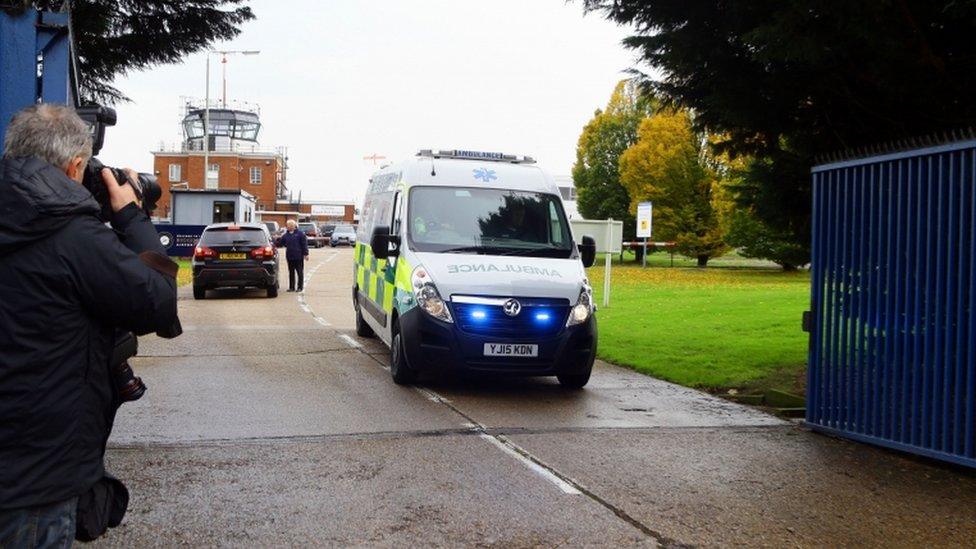
An ambulance arrived at London's Biggin Hill Airport ahead of Mr Aamer's return
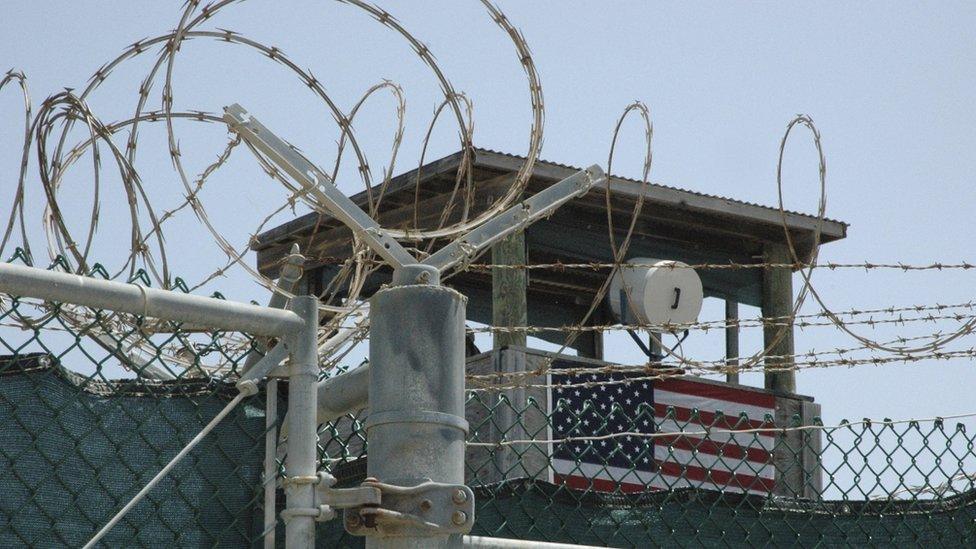
Mr Aamer was detained at Guantanamo for 13 years
Mr Aamer, who was first held by US authorities in Afghanistan in 2001, maintains he was in the country doing charity work.
Since 2007 Mr Aamer, who claims he was tortured, has been cleared for release twice, by US presidents George W Bush and then Barack Obama.
It is understood Mr Aamer will go through standard immigration checks now he has arrived in the UK.
Mr Aamer's legal representative Clive Stafford Smith told BBC News: "Shaker only wants the truth to come out he is not interested in persecuting anyone.
"His first priority is health - he really is in terrible shape."
In letters sent to the BBC by his lawyers earlier this month, Mr Aamer described himself as "an old car that has not been to the garage for years", saying the first thing he wanted once freed was a cup of coffee.

Analysis
Campaigner Joanne MacInnes says Shaker Aamer 'needs TLC’ on return
By Dominic Casciani, BBC home affairs correspondent
When the business jet carrying Shaker Aamer landed in London he was met by British officials.
His lawyers say he will need urgent medical and mental assessments. He may, like others who have been held at Guantanamo, be suffering from post traumatic stress disorder.
While the PM has said Mr Aamer won't be detained, it's unlikely we will ever find out if MI5 separately decides to monitor him - by definition its work is secret.
Mr Aamer is said to be relaxed about such prospects and has asked his lawyers to make clear he believes he has a "contract" to honour with the people of Britain. Shaker Aamer's return is the end of an astonishing and murky personal saga. But it's by no means the end of the story.
The government's long-promised investigation into substantial allegations that our agencies became mixed up in rendition and torture - unwittingly or otherwise - hasn't happened.
Shaker Aamer and many others want to know the truth.

'Falsely imprisoned'
Mr Aamer's release has been welcomed by some human rights groups and a number of MPs - but others say serious questions remain unanswered.
Amnesty International said Mr Aamer's alleged torture in front of British agents in Afghanistan was a very serious claim that required investigation.
Tory MP David Davis said he was keen to speak to Mr Aamer, saying: "When Mr Aamer is ready to talk, the Shaker Aamer All-Party Parliamentary Group, and I am sure many more MPs, look forward to seeing what he has to say about his detention."
Who is Shaker Aamer and why was he held in Guantanamo Bay?
Shadow chancellor John McDonnell said: "Shaker was simply a man in the wrong place at the wrong time, a charity worker building wells in Afghanistan who was kidnapped, ransomed and falsely imprisoned."
But Robin Simcox, a research fellow at the Henry Jackson Society - a think tank which supports liberal democracies and an interventionist approach to foreign affairs - said: "Any joy and relief at his release must be tempered by the fact that this is someone who has had very serious questions posed of his past connections and conduct."
Lawyer and journalist Jonathan Foreman told the BBC Mr Aamer's lack of a trial was "not so incredible" because he was "not detained in the same way as a criminal trial, he was detained on the battlefield as an unlawful combatant".
'Approved for transfer'
Mr Aamer was detained in Afghanistan by bounty hunters tracking down and handing over possible al-Qaeda suspects, shortly after the 9/11 attacks in the US.
He was detained on the same day his youngest son was born, and has never seen him.
Mr Aamer was first held by US forces at Bagram air base, near Kabul, where his lawyers say he was tortured. They say he made false confessions to end his torture.
In February 2002, Mr Aamer was transferred to Guantanamo Bay, where his lawyers say he suffered further abuse.
The US Department of Defense said on Friday a review had been conducted of Mr Aamer's case.
"As a result of that review, which examined a number of factors, including security issues, Aamer was unanimously approved for transfer." the statement said.

Some 112 people are still being held at Guantanamo, which President Obama has promised to close, the statement confirmed.
Guantanamo Bay is a US military prison in Cuba, set up during the "war on terror" in 2002 to detain what the US government called "enemy combatants".
The first 20 detainees were transferred to the facility on 11 January of that year, and a total of 780 men have been held since then - the vast majority without charge or criminal trial.
- Published31 October 2015
- Published22 October 2015
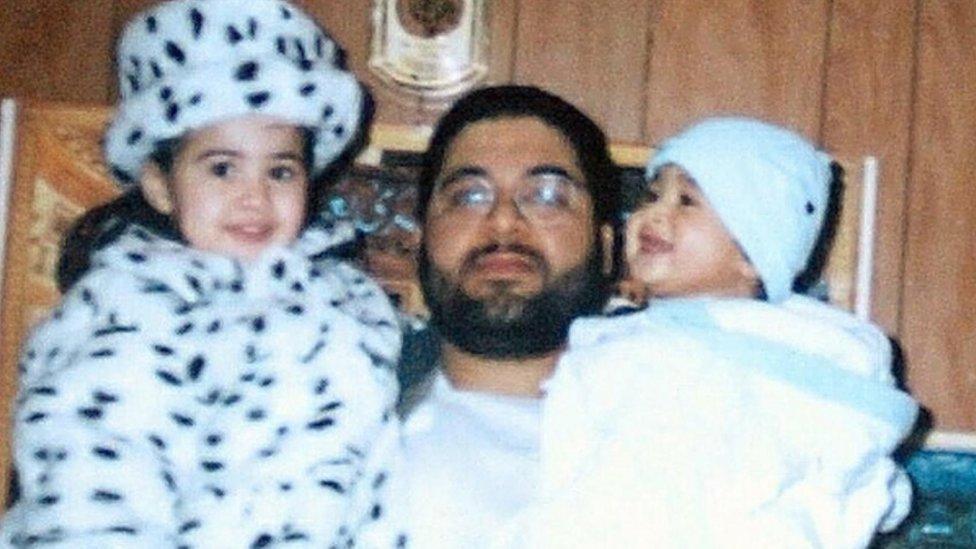
- Published27 May 2015
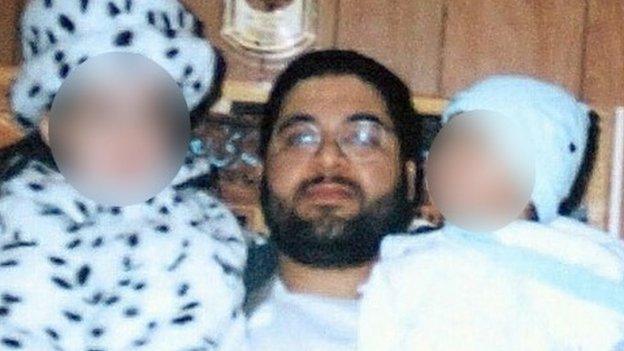
- Published19 November 2013
